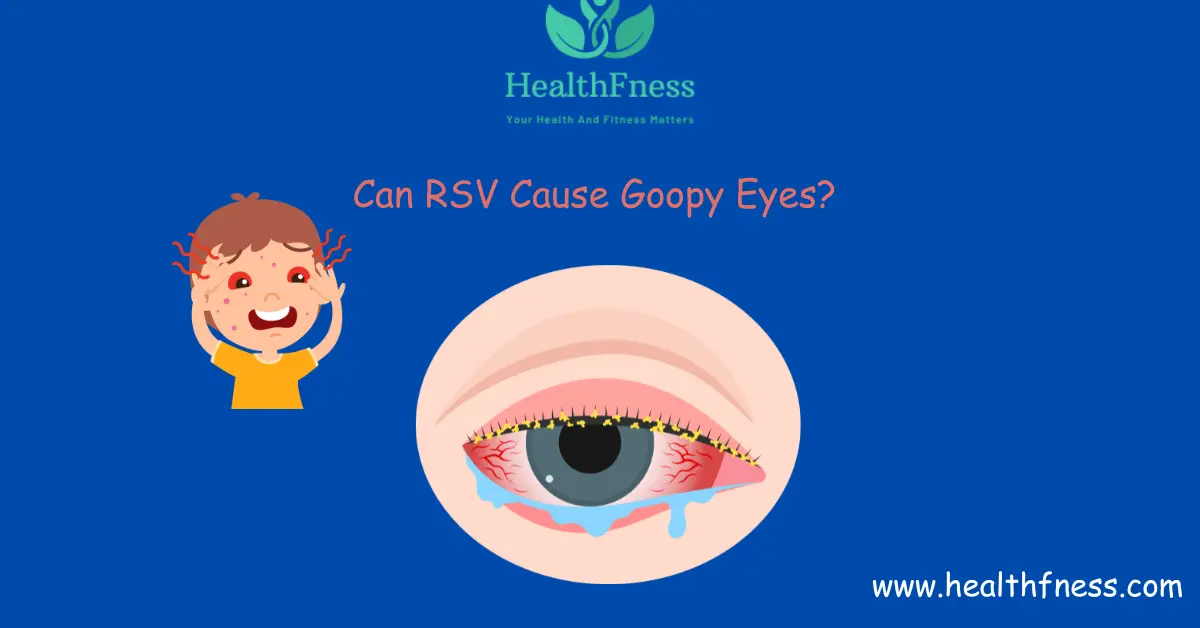Can RSV Cause Goopy Eyes?
Not many people know this and you’re not alone. But if your child suddenly develops what we call ‘goopy eyes’, you might want to familiarize yourself with this term and get your child checked with a doctor.
Understanding What is RSV?
Respiratory Syncytial Virus (RSV) is a common respiratory virus that usually causes mild, cold-like symptoms. It’s particularly common in infants and young children, though it can affect individuals of all ages.
RSV Symptoms
Respiratory Syncytial Virus (RSV) is a common viral infection that primarily affects the respiratory system, particularly in young children and older adults. The symptoms of RSV are often reminiscent of a cold or flu, making it difficult to distinguish at first. Typical indicators include a runny nose, decreased appetite, persistent coughing, frequent sneezing, and the presence of fever.
Additionally, some individuals may experience wheezing, especially in those with a history of respiratory issues like asthma. However, what sets RSV apart from other common respiratory infections is its potential to cause more severe complications in vulnerable populations.
Can RSV Cause Goopy Eyes? Fact or Myth
Causes
Goopy eyes, technically known as conjunctivitis or “pink eye”, is a common eye condition characterized by inflammation of the conjunctiva—the thin, transparent layer covering the white part of the eye and the inner surface of the eyelids. This condition can be triggered by several factors, making it essential to understand its diverse causes for effective management and prevention.
- Viral conjunctivitis, on the other hand, is commonly associated with viruses responsible for the common cold, such as adenoviruses, or even the measles virus.
- People with viral conjunctivitis may experience symptoms like redness, excessive tearing, and sensitivity to light.
- It’s vital to note that viral conjunctivitis can be highly contagious, so proper hygiene measures and avoiding contact with infected individuals are essential for limiting its spread.
Symptoms
- Common symptoms of eye infections or inflammations, such as conjunctivitis, include redness, itching, and a sticky discharge that can often cause the eyelids to feel as if they are sealed shut, particularly upon waking after a night’s sleep. This discharge, often colloquially referred to as ‘goop’, can range from a thin, watery consistency to a thicker, pus-like substance. It’s typically white or yellow in color and can sometimes form crusts on the eyelashes.
- This feeling of having your eyelids ‘glued shut’ is due to the sticky discharge drying out, which can cause a slight discomfort or distress. It’s more common in the morning since the discharge has had the whole night to dry while you sleep. Rubbing your eyes can also exacerbate this sensation, as it may lead to additional inflammation, swelling, and discomfort.
- The redness and itching associated with these symptoms often result from the body’s inflammatory response to a bacterial, viral, or allergic trigger. Redness is caused by dilation and inflammation of the blood vessels in the eye, which is a response designed to bring more immune cells to the site to fight off infection. The itching is a side effect of the inflammation, and while it can be irritating, it’s essential not to scratch or rub your eyes excessively as this can lead to further irritation or potential damage.
All these symptoms can vary in severity and duration, depending on the cause of the eye issue. While these symptoms can often be managed with over-the-counter treatments or simple home remedies.
RSV and Goopy Eyes
How are they linked?
RSV and goopy eyes? You might be scratching your head, but there’s a connection here.
Can RSV cause Goopy Eyes?
Yes, it can. Though RSV primarily affects the respiratory system, it can also lead to conjunctivitis in some cases, leading to those unpleasant goopy eyes.
Treatment
Home Remedies
For goopy eyes caused by RSV, you can try cleaning the eyes gently with a warm, damp cloth several times a day.
Medical Treatment
If symptoms persist, consult your healthcare provider. They may prescribe antiviral medication for severe RSV cases or antibiotics if bacterial conjunctivitis is suspected.
Prevention
RSV Prevention
Hand hygiene, avoiding close contact with sick individuals, and cleaning high-touch surfaces can help prevent the spread of RSV.
Goopy Eyes Prevention
To avoid goopy eyes, refrain from touching or rubbing your eyes and wash your hands regularly.
Risks & Complications
If left untreated, conjunctivitis caused by RSV can lead to complications like keratitis or even vision loss in rare cases.
FAQs
Can adults get RSV?
Yes, adults can get RSV, though symptoms are typically milder than in children.
Can RSV recur?
Yes, reinfection is possible as immunity after RSV infection is incomplete and decreases over time.
Can I prevent RSV?
While there's no vaccine for RSV yet, practicing good hygiene and avoiding contact with sick people can help prevent it.
How long does conjunctivitis last?
Conjunctivitis usually resolves within 1 to 2 weeks.
When should I see a doctor for goopy eyes?
If symptoms persist for more than a week, cause eye pain, or are accompanied by vision problems, consult a healthcare provider immediately.
Conclusion
While goopy eyes are not typically considered a common symptom of RSV infection, some individuals may experience conjunctivitis or pink eye as a result of the virus. It can cause redness, itching, discharge, and a “goopy” or sticky feeling in the eyes.
It’s important to note that not everyone with RSV will develop goopy eyes or conjunctivitis. The severity and range of symptoms can vary from person to person.
Preventing the spread of RSV through proper hygiene practices such as frequent handwashing and avoiding close contact with infected individuals can help reduce the risk of both respiratory symptoms and potential eye complications associated with this viral infection.

